Local
Maryland Senate passes same-sex marriage bill
O’Malley set to sign next week; bruising referendum campaign to begin
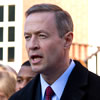
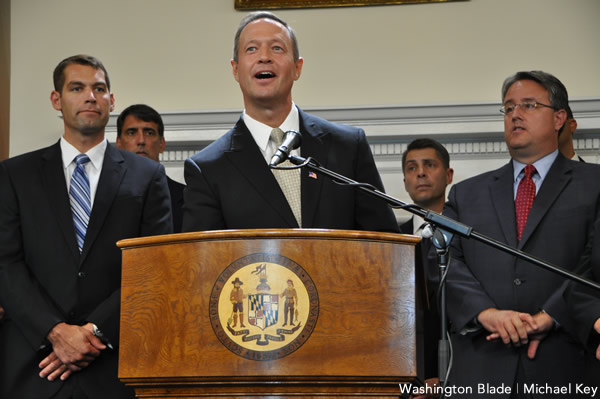
Maryland Gov. Martin O’Malley has pledged to sign a bill extending marriage rights to same-sex couples. (Blade photo by Michael Key)
The Maryland Senate voted 25 to 22 Thursday night to approve a bill to legalize same-sex marriage, clearing its final hurdle in the state legislature before it goes to Gov. Martin O’Malley, who has pledged to sign it.
The historic vote triggered a burst of applause and cheers in the Senate chamber by supportive lawmakers and LGBT activists, who packed the visitor’s gallery.
“We could not be more grateful to the senators who today voted to make all Maryland families stronger,” said Joe Solmonese, president of the Human Rights Campaign, which is a member of Marylanders for Marriage Equality, a coalition of LGBT and allied organizations that pushed for the bill.
“Today we took another giant step toward marriage equality becoming law – and we are in this position due to the unwavering leadership and resolve of Gov. O’Malley and our legislative allies,” Solmonese said.
U.S. House Minority Leader Nancy Pelosi (D-Calif.) called the Senate vote “an extraordinary victory for the people of Maryland and a critical step forward in the march for marriage equality nationwide.”
Pelosi added, “As a native Marylander, this vote is a source of personal pride; as an American this action is a symbol of our progress as a nation and as a people.”
The Senate vote came six days after the Maryland House of Delegates passed the bill by a razor-thin one-vote margin. That vote followed an intense lobbying effort by O’Malley, who is credited with helping to persuade the few wavering Democratic delegates needed to put the bill over the top.
Unlike past years, O’Malley this year introduced the marriage bill as part of his legislative package and placed all of the resources of his office behind the bill.
But supportive and opposing lawmakers acknowledged in the Senate floor debate Thursday night that the Civil Marriage Protection Act now faces its most daunting hurdle — a bruising referendum campaign leading up to the November election, when voters will have the final say on whether the bill should be enacted into law.
Public opinion polls show Maryland voters are nearly evenly divided on the issue of same-sex marriage, with supporters showing a slight lead.
Most political observers believe opponents of the bill have the resources to gather the required number of petition signatures needed to place the measure on the ballot in the November election, when President Barack Obama’s name will also be on the ballot.
The bill died in the House of Delegates last year after clearing the Senate. Supporters decided to pull it from the House floor without a vote after determining they didn’t have the votes to pass it.
The Senate passed the bill last year by a vote of 25-21. Its approval of the bill on Thursday night by a 25-22 vote did not represent a change in the breakdown of supporters and opponents, according to observers at the state capital in Annapolis.
Sen. Joanne Benson (D-Prince George’s County) announced her opposition to the bill last year but was unable to reach the Senate floor to vote at that time, resulting in her being listed as not voting. Benson voted ‘no’ on the bill this time.
She was among 11 Democrats who voted against the bill on Thursday, opposing the 24 Democrats who voted ‘yes’ in the 47-member Senate.
Eleven Republicans voted against the bill, with just one, Sen. Allan Kittleman (R-Carroll & Howard Counties), voting for it.
In the House debate last week several opponents delivered highly emotional speeches condemning the bill as a threat to traditional marriage and an infringement on religious rights. Thursday’s Senate debate was more measured, with opponents saying their positions were based mostly on religious beliefs while expressing respect for same-sex couples.
Sen. Jamie Raskin (D-Montgomery County), an American University law professor, served as floor leader for the marriage bill. LGBT advocates for the bill have long credited him with using a firm but diplomatic approach in refuting arguments that legalizing same-sex marriage would infringe on religious rights or create problems for traditional marriage.
Sen. Rich Madaleno (D-Montgomery County), the Senate’s only openly gay member, called on his colleagues to support the bill to provide equality and dignity to “all” families, including those headed by same-sex couples.
“We all cherish families,” he said, adding that the bill is intended for “people who find love and want a family.”
Noting that he and his partner are raising two kids, Madaleno said he considers himself a “married man” and part of the “family of Maryland” without the right to legalize his and his partner’s relationship with a marriage license.
“It is the marriage license that symbolizes the commitment,” he said. “It makes it worthwhile. I want that marriage license in the State of Maryland.”
In his closing remarks, Raskin praised his fellow senators on both sides of the political aisle for their “extraordinary civility and decency and even affection that pervaded these very tough discussions.”
He told of his personal bout with colon cancer last year, just as the Senate deliberated over the marriage bill, saying his doctors have given him a “clean bill of health” at this time.
“But I learned that there is a difference between misfortune and injustice in life,” he said, noting that a cancer diagnosis, which can happen to anyone, is a misfortune.
“But if you find someone to love in this life and to have and to hold and to dedicate your life to and you have kids together and you want to be married… and you can’t do it, that’s not a misfortune, that’s an injustice because we have the power to do something about it,” he said. “And today we have.”
Senate observers said Senate President Thomas V. Mike Miller (D-Anne Arundel County), who voted against the bill, took the unusual step of explaining why he did so. Miller, who has said all along that he opposes same-sex marriage on religious grounds, has been praised by the bill’s supporters for making sure it would reach the floor for a vote.
“Am I on the wrong side of history?” he asked. “As a historian, there is no doubt about it… I believe marriage is between a husband and a wife and that is why I voted the way I did,” he said.
Should Maryland’s marriage equality bill clear the referendum hurdle, the state joins D.C., Massachusetts, New York, Iowa, New Hampshire, Connecticut, Vermont and Washington State in allowing same-sex couples to marry.
“There remains a lot of work to do between now and November to make marriage equality a reality in Maryland,” said HRC’s Solmonese. “Along with coalition partners, we look forward to educating and engaging voters about what this bill does. It strengthens all Maryland families and protects religious liberty.”
Evan Wolfson, executive director of Freedom to Marry, the national same-sex marriage advocacy organization, startled HRC and other partners of the Marylanders for Marriage Equality coalition earlier this year when he expressed concern that supporters of the bill had not demonstrated the capability to win in a referendum fight.
“Lesbian and gay couples, their families, and non-gay friends and neighbors made a powerful case for the freedom to marry, which all should enjoy,” Wolfson told the Blade after the Maryland Senate vote Thursday night.
“The lawmakers responded to these moving stories of love and commitment,” he said. “Now, HRC, Marylanders for Marriage Equality, and those who led the passage of this bill must defend it against the attack coming in November. “
Asked if Freedom to Marry would become involved in the Maryland referendum fight, Wolfson said only, “You have my comment.”
Here’s how Maryland’s senators voted:
Voting Yea
Brochin, James (D) Baltimore Co.
Conway, Joan Carter (D) Baltimore
Ferguson, William C., IV (D) Baltimore
Forehand, Jennie M. (D) Montgomery
Frosh, Brian E. (D) Montgomery
Garagiola, Robert J. (D) Montgomery
Gladden, Lisa A. (D) Baltimore
Jones-Rodwell, Verna L. (D) Baltimore
Kasemeyer, Edward J. (D) Howard
Kelley, Delores G. (D) Baltimore Co.
King, Nancy J. (D) Montgomery
Kittleman, Allan H. (R) Howard
Klausmeier, Katherine A. (D) Baltimore Co.
Madaleno, Richard S., Jr. (D) Montgomery
Manno, Roger (D) Montgomery
McFadden, Nathaniel J. (D) Baltimore
Montgomery, Karen S. (D) Montgomery
Pinsky, Paul G. (D) Prince George’s
Pugh, Catherine E. (D) Baltimore
Ramirez, Victor R. (D) Prince George’s
Raskin, Jamie B. (D) Montgomery
Robey, James N. (D) Howard
Rosapepe, James C. (D) Prince George’s
Young, Ronald N. (D) Frederick
Zirkin, Robert A. (D) Baltimore Co.
Voting Nay
Astle, John C. (D) Anne Arundel
Benson, Joanne C. (D) Prince George’s
Brinkley, David R. (R) Frederick
Colburn, Richard F. (R) Dorchester
Currie, Ulysses (D), Prince George’s
DeGrange, James E., Sr. (D) Anne Arundel
Dyson, Roy P. (D) St. Mary’s
Edwards, George C. (R) Garrett
Getty, Joseph M. (R), Carroll
Glassman, Barry (R) Harford
Jacobs, Nancy (R) Harford
Jennings, J. B. (R) Harford
Mathias, James N., Jr. (D) Worcester
Middleton, Thomas M. (D) Charles
Miller, Thomas V. Mike (D) Calvert
Muse, C. Anthony (D) Prince George’s
Peters, Douglas J. J. (D) Prince George’s
Pipkin, E. J. (R) Cecil
Reilly, Edward R. (R) Anne Arundel
Shank, Christopher B. (R) Washington
Simonaire, Bryan W. (R) Anne Arundel
Stone, Norman R., Jr. (D) Baltimore Co.
Maryland
Silver Spring holds annual Pride In The Plaza
‘Today means inclusion. It means to build resilience’

Silver Spring’s annual Pride in the Plaza event took place on Sunday to celebrate the LGBTQ community and emphasize inclusion and resilience.
“Today means inclusion. It means to build resilience, love,” Robyn Woods, program and outreach director for Live In Your Truth, which organized the event, said. “I mean, just being surrounded by the community and so many great entrepreneurs, business owners, and just being a part of this whole rainbow coalition that we call the LGBTQIA to be about.”
With the event being her first time organizing for Live In Your Truth, Woods said she felt emotional to see the support and love at the event.
“Some people (are) bringing out their children, their babies, their grandparents,” Woods said. “It’s a lot more allies here than anything else. That type of support to me means so much more than just support from my community; just outside support, inside support, so much support around it, so much love. Everyone’s smiling outside, helping each other.”
Attendees of the event were able to head over to the Family Fun Zone, an air-conditioned Pride Cool Down Lounge, or watch live drag performances in the main stage area.
Along with entertainment and a shaved-ice stand, rows of information tables stood along the plaza, including FreeState Justice, the Washington Spirit, Trans Maryland, Moco Pride Center, and the Heartwood Program, an organization that offers support, therapy, education, and resources to the LGBTQ community.
“I want people to know about our services, and I love what we have to offer,” Jessica Simon, psychotherapist for Heartwood Program’s Gender Wellness Clinic, said. “I (also) want to be part of a celebration with the community, and so it feels good to be here with other people who have something they want to give to the community.”
She added that within today’s political climate, to which she called an “antidote to shame,” it’s important to be celebrating Pride.
“There’s a lot of demonization of LGBTQI people,” Siena Iacuvazzi, facilitator for Maryland Trans Unity, said. “(Pride) is part of the healing process.”
Iacuvazzi said she was taught to be ashamed of who she was growing up, but being a part of a community helped her flourish in the future.
“I was taught how to hate myself. I was taught that I was an abomination to God,” she said. “But being a community is like understanding that there are people who have experienced the same thing, and they’re flourishing. They’re flourishing because they’re willing to stand up for themselves as human beings and discover themselves and understand what’s true for themselves.”
She added that Pride allows for a mutual understanding to take place.
“It’s more of a sense of belonging … and just taking that home and understanding you’re not alone,” Iacuvazzi said. “We’re each taking our own journey — we’re not putting that on each other. It’s just walking away with a sense of belonging and humanity.”
Similar to Iacuvazzi, Woods said she hopes attendees’ biggest takeaways would be family, fun, resilience, and pride.
“Being proud of yourself, being happy for who you are, and representation and how much it matters,” she continued. “And I think all these young people that are walking around here get to see versions of themselves, but older. They get to see so many different lesbian, gay, bisexual, pansexual people that are successful, that are showing love, that care, and it’s not how we’re portrayed in the media. It’s lovely to see it out here. (It’s) like we’re one big old, happy family.”
Virginia
Spanberger touts equality, reproductive rights in Arlington
Democratic Va. gubernatorial nominee made campaign stop at Freddie’s Beach Bar
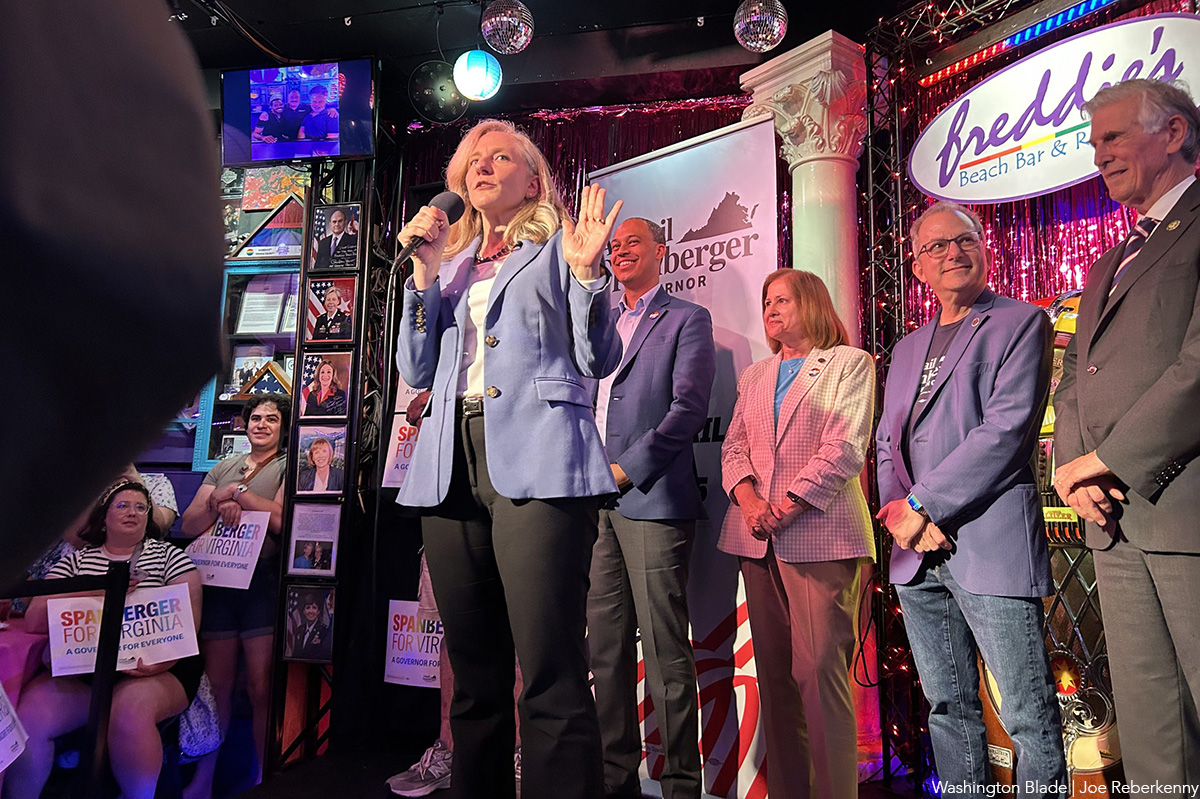
With the general election heating up and LGBTQ rights under increasing threat nationwide, Virginia gubernatorial candidate Abigail Spanberger brought her “Span Virginia Bus Tour” to Arlington’s Freddie’s Beach Bar for a campaign stop filled with cheers, policy pledges, and community spirit.
Spanberger, who served three terms in the U.S. House of Representatives from 2019 through early 2025 for Virginia’s 7th Congressional District, also served as a federal law enforcement officer specializing in narcotics and money laundering cases, and as a CIA case officer working on counterterrorism and nuclear counterproliferation.
Spanberger is running against Republican nominee Winsome Earle-Sears, the current lieutenant governor of Virginia, who said she was “morally opposed” to a bill protecting marriage equality in the commonwealth.
She was joined by other Democratic candidates and supporters: lieutenant gubernatorial candidate Ghazala Hashmi, attorney general candidate Jay Jones, Virginia state Sen. Adam Ebbin (D-Alexandria), and Congressman Don Beyer.
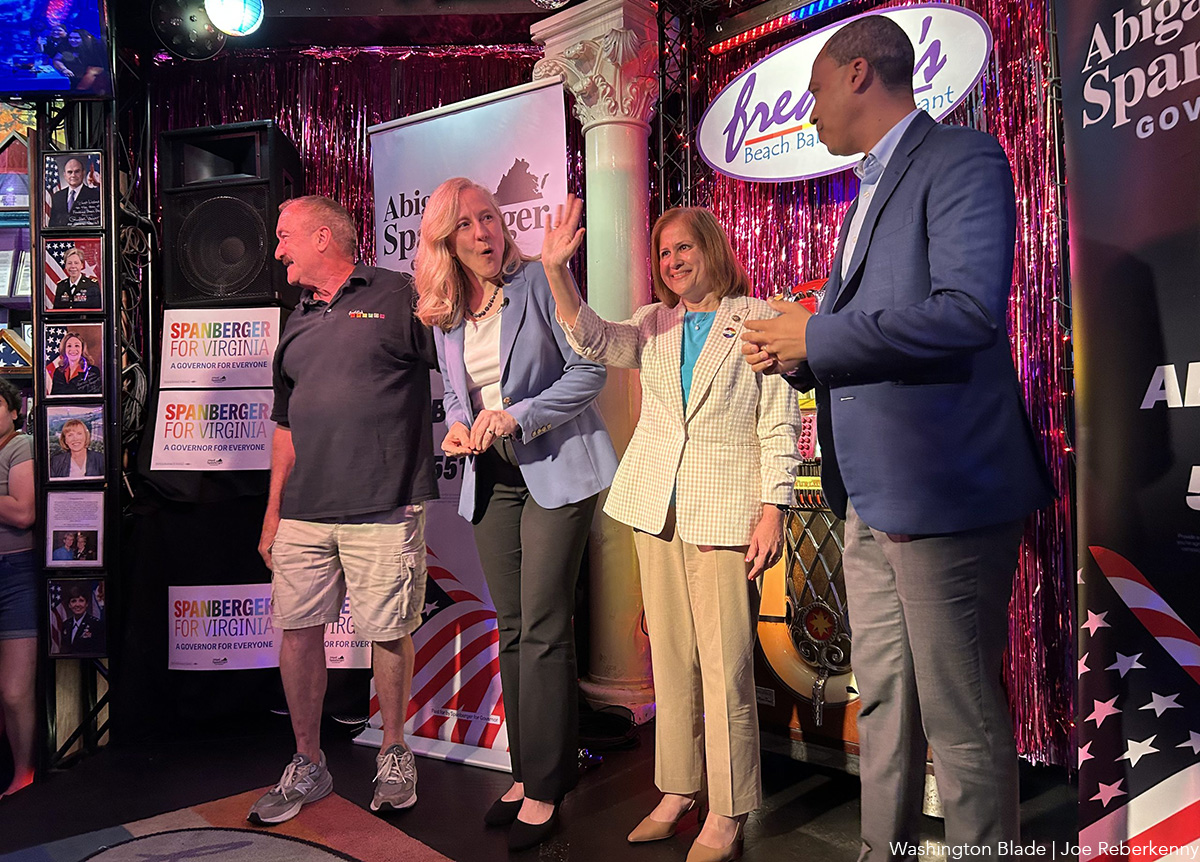
Freddie’s was packed wall-to-wall with supporters, many of whom wore “Spanberger for Virginia” shirts in the progressive Pride flag colors. In her speech, she made it clear that LGBTQ Virginians’ rights are on the ballot this year.
“I’m so excited to be here, and I am so grateful to the entire staff of Freddy’s for letting us overtake this incredible venue that is not just an awesome place to come together in community, but is a symbol to so many people of joy, of happiness, of community and of celebrating our friends and our neighbors,” Spanberger told the packed restaurant. “It is exciting to be here, and particularly during this Pride month, and particularly as we reflect on the 10-year anniversary of Obergefell and the reality that we still have so much work to do.”
“The reality is there are so many people who still would be inclined to take us backwards,” she said. “In this moment when we see attacks on people’s rights, on people’s humanity, on Virginia, on our economy, on research, on public education, on food security, on health care, on Virginians, on their jobs, on public service and on people — it can get heavy.”
“What it does for me is it makes me want to double down, because once upon a time, when I was talking to my mother about some horror show or sequence of activities coming out of a particular administration, she did not really have the patience to listen to me and said ‘Abigail, let your rage fuel you’ — and the conversation was over. And so I reflect on that, because, in fact, every day there is so much fuel to be had in this world and in this moment.”
One of the points Spanberger continued to emphasize was the importance of steadfast state government officials following the election of President Donald Trump, which has led to rollbacks of LGBTQ and bodily autonomy rights as a result of the conservative-majority U.S. Supreme Court.
“What the past few years have shown us is that a Supreme Court decision, no matter how many years we have celebrated its existence, does not protect us in the long term. And so as governor, I will work to make sure that every protection we can put in place for the dignity, the value, and the equal rights of all Virginians is a priority.”
During her speech, Spanberger highlighted several of the key values driving her campaign — protecting reproductive freedom and human rights, lowering healthcare costs, safeguarding Virginia’s environment, and ensuring that public education is affordable, accessible, and rooted in truth, not politics.
Spanberger went as far as to say that she wants to amend the state’s constitution to remove Section 15-A. “The reality is that in Virginia, we still have a ban in our state constitution on marriage equality. It is of the utmost urgency that we move forward with our constitutional amendment.”
“We will work to ensure that that terrible constitutional amendment, that was put in years ago, is taken out and updated and ensuring that Virginia is reflective in our most essential documents of who we are as a commonwealth, which is an accepting place that celebrates the vibrancy of every single person and recognizes that all Virginians have a place, both in that constitution and in law,” she added.
Following the event, two supporters spoke to the Washington Blade about why they had come out to support Spanberger.
“I came out because I needed to show support for this ticket, because it has been a particularly rough week, but a long few years for our rights in this country, in this state, with this governor, and it’s — we need to flip it around, because queer people need protection,” said Samantha Perez, who lives in Ballston. “Trans people need protection. Trans kids need protection. And it’s not gonna happen with who’s in Richmond right now, and we just need to get it turned around.”
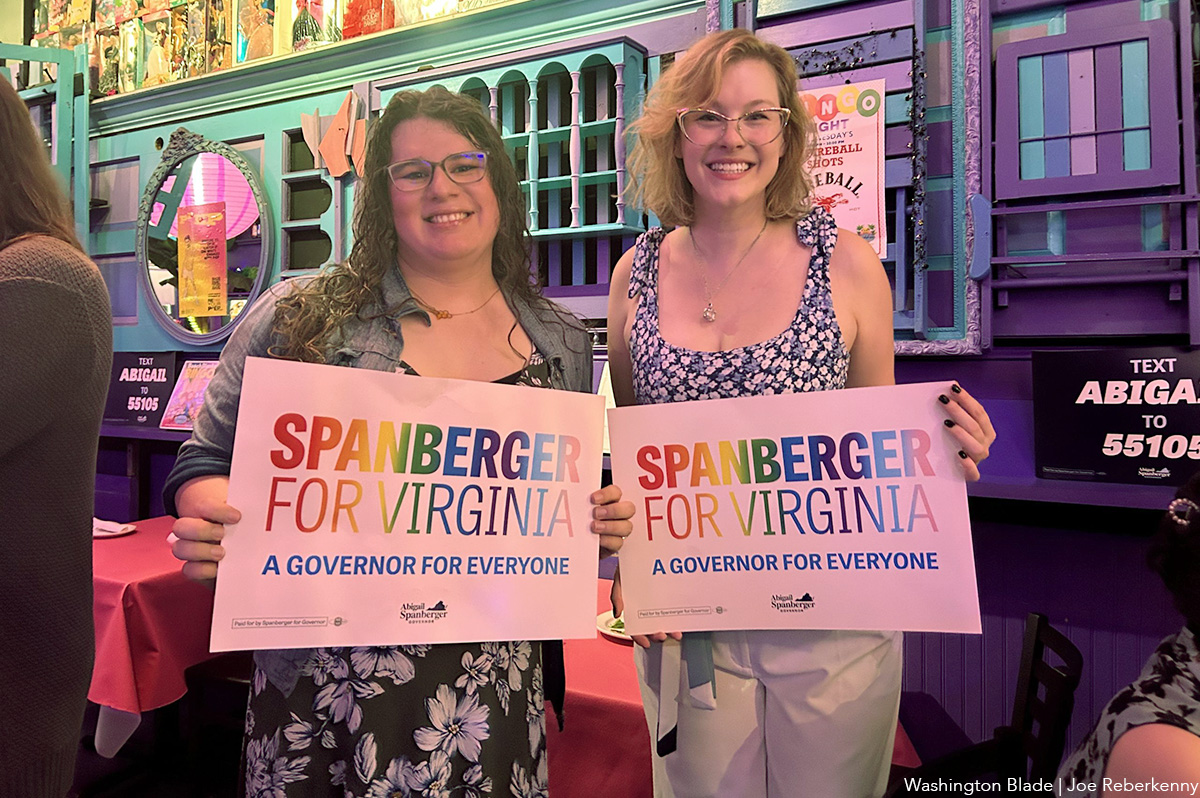
“The whole neighborhood’s here. All our friends are here,” said Annie Styles of Pentagon City. “It means the world to me to take care of each other. That’s what a good community does. That’s not what we’ve had with the Republicans here or across the nation for a really long time. It’s time to show that care. It’s time to make sure that good people are in a position to do good things.”
District of Columbia
Activists protest outside Hungarian Embassy in DC
Budapest Pride scheduled to take place Saturday, despite ban

More than two dozen activists gathered in front of the Hungarian Embassy in D.C. on Friday to protest the country’s ban on Budapest Pride and other LGBTQ-specific events.
Amnesty International USA Executive Director Paul O’Brien read a letter that Dávid Vig, executive director of Amnesty International Hungary, wrote.
“For 30 years Budapest Pride has been a celebration of hope, courage, and love,” said Vig in the letter that O’Brien read. “Each march through the streets of Budapest has been a powerful testament to the resilience of those who dare to demand equality, but a new law threatens to erase Pride and silence everyone who demands equal rights for LGBTI people.”
“The Hungarian government’s relentless campaign against LGBTI rights represents a worrying trend that can spread normalizing division and hatred,” added Vig. “Thank you for standing with us when we refuse to be intimidated.”
Council for Global Equality Chair Mark Bromley and two of his colleagues — Stephen Leonelli and Keifer Buckingham — also spoke. Health GAP Executive Director Asia Russell and Chloe Schwenke, a political appointee in the Obama-Biden administration who worked for the U.S. Agency for International Development, and Planned Parenthood staffers are among those who attended the protest.
(Washington Blade video by Michael K. Lavers)
Hungarian lawmakers in March passed a bill that bans Pride events and allow authorities to use facial recognition technology to identify those who participate in them. MPs in April amended the Hungarian constitution to ban public LGBTQ events.
Budapest Pride is scheduled to take place on Saturday, despite the ban. Hundreds of European lawmakers are expected to participate.
“Sending strength to the patriotic Hungarians marching tomorrow to advance human dignity and fundamental rights in a country they love,” said David Pressman, the gay former U.S. Ambassador to Hungary, on Friday on social media.
Sending strength to the patriotic Hungarians marching tomorrow to advance human dignity and fundamental rights in a country they love. Szabadság és szerelem. My past remarks on Budapest Pride: https://t.co/y1QhA9QouA
— David Pressman (@AmbPressman) June 27, 2025
-

 U.S. Supreme Court3 days ago
U.S. Supreme Court3 days agoSupreme Court upholds ACA rule that makes PrEP, other preventative care free
-

 U.S. Supreme Court3 days ago
U.S. Supreme Court3 days agoSupreme Court rules parents must have option to opt children out of LGBTQ-specific lessons
-

 India5 days ago
India5 days agoIndian court rules a transgender woman is a woman
-

 National4 days ago
National4 days agoEvan Wolfson on the 10-year legacy of marriage equality










